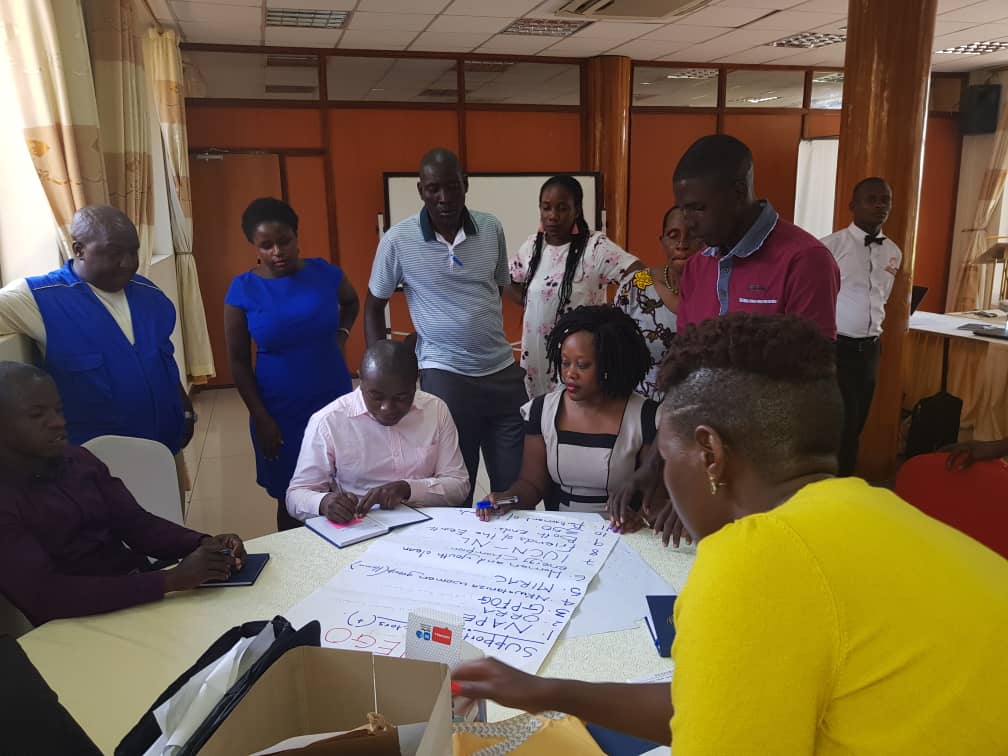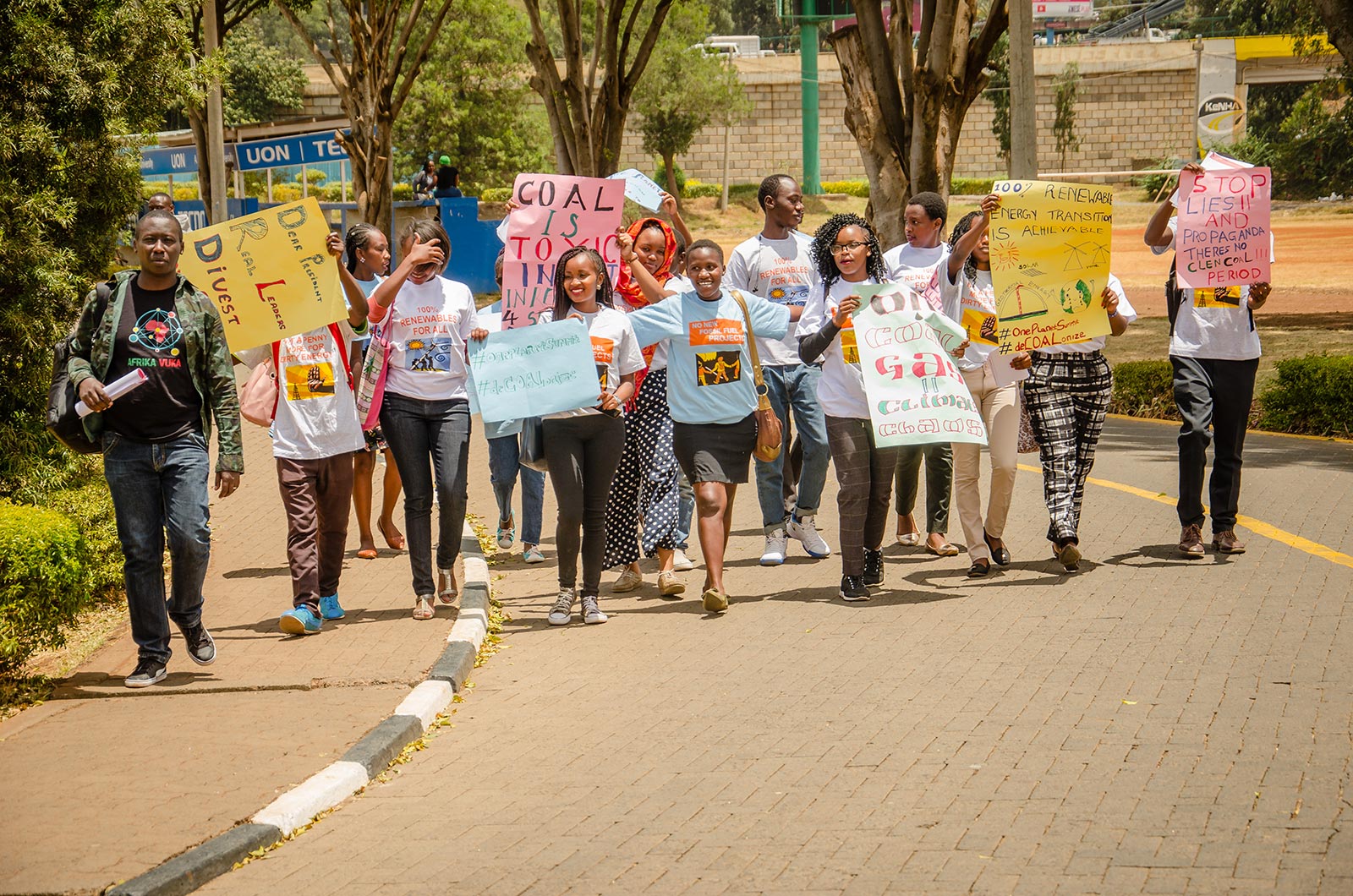Defending the Defenders
Last week Ugandan environmental defenders working around issues of environment and extractives met in Kampala for a 5-day workshop on risk assessment and security planning. The workshop was organized by Defend Defenders.

Five organizations working in the environment and extractives were present at the training that aimed at equipping participants with basic knowledge and skills on physical and digital security alongside empowering the participants to conduct security risk assessments and to identify strategies that would help them mitigate risks.
The workshop was inspired by a risk assessment done by DefendDefenders of the organizations that participated in the court case against Total for alleged human and environmental rights violations triggered by its operations in Uganda. Total is one of two operating companies of the Lake Albert Oil Project, together with China National Offshore Oil Corporation (CNOOC), and of the giant pipeline EACOP project., The risk assessment concluded the need to build the capacity of the organizations involved in order to ensure they are ready to prevent and respond to any security threats related to their work.
This comes a few weeks after a similar gathering organized by 350.org took place in Brazil that brought together climate defenders from 5 continents and 23 countries whose aim was to equip participants involved with similar skills and capacity related to safety, resilience and cross-regional solidarity.
Youths in Nairobi oppose the proposed coal plant project in Lamu: Advocates for green energy
On 14th of March 2019, youths in Nairobi took a dire initiative to oppose the 1,050 megawatts coal plant project. A project under Amu Power Company (a special purpose joint venture of Gulf Energy and Centum Investment) is to be established at Kwasasi Village in Hindi Division, Lamu west.
With their placards raised high, the youths walked through the University of Nairobi from end to end hiking the awareness of the harmful flip of the project. They talked one on one with students as they gave out the factsheets that had well-defined details of the intended project. The project is prospected to beget harmful health and environmental effects, livelihood effects on communities, unprofitable and unsound economics and violation in licenses.
Additionally, the youths had alternative solutions on their placards that could be put in place instead of the detrimental project. They vehemently advocated for green energy as they passed the same knowledge to fellow youths.

The youths roundly tweeted their dissents using the hashtag #deCOALonize and #OnePlanetSummit. They directed their messages and awareness to The Kenya Government and French Government following the 3rd global One Planet Summit that was taking place in Nairobi Kenya at the United Nations.
Today in #Kenya, the One Planet Summit kicks off. The Summit's goal is to accelerate and step up climate action for Africa. One of the main sponsors is the African Development Bank, who has yet to make this commitment. Ask the AfDB to go 100% renewables https://t.co/Azg0dSpwMf pic.twitter.com/LazAwnbIwT
— 350 Africa (@350Africa) March 14, 2019
The Summit was geared to focus on ways to accelerate and step-up climate action in Africa and specifically on expanding renewable energy, protecting biodiversity, and boosting adaptation and resilience.
Activist groups such as Save Lamu, Lamu Youth Alliance, deCOALonize Coalition, NGOs etc. have been campaigning tirelessly to stop the building of the proposed coal plant in Lamu, Kwa Sasi region. This was an effort under 350 in support of the deCOALonize campaign and is one of many to come strategic actions, to #deCOALonize Kenya.
- Ian Elroy Ogonji, 350Kenya Volunteer.
Why we’re Breaking Free from fossil fuels on the 25th of May
We’re gearing up in South Africa and together with groups from all over the continent to #BreakFree from fossil fuels on the 25th of May - Africa Day. With groups hosting events in many different countries, we hope it will be a day where we demonstrate that African people do not want fossil fuels.
This is why we think this work is so important:
- Fossil fuels are killing us. Burning of coal for electricity causes terrible air pollution which has been shown to be responsible for illness and deaths among those affected.

- Climate change is impacting our continent hardest, displacing people and destroying livelihoods.
 Image © AlJazeera
Image © AlJazeera - We believe a more equitable energy future is possible. Renewable energy has the potential to put the power of generation in many people's hands, not only a few.

- We need a united voice. There are many African people and groups working to end the age of fossil fuels in Africa, if we all come together at the same time though, our voices are more powerful. deCOALonise.africa was started in order to do this.

What are your reasons for getting involved? We’d love to hear them.
You can help us by joining an event near you, or hosting your own event. Can you believe that our very own African Development Bank is financing coal-fired power plants all over Africa? Join us in showing them that we want to deCOALonise our continent!
#ThumaMina – call on the DBSA to publicly commit to not financing new coal
We all know we don't need another coal plant. Besides the immediate impact on the health of people living close to the plant, emissions from coal-fired power plants contribute to climate change. Burning more coal will only lead to more catastrophic climate change, more extreme weather and even more impacts like the drought in the Cape and dangerous storms. Coal is killing us and our planet and it's time we took action to stop it.
South Africa is at the shore of a national water crisis. Corruption within the coal sector threatens the country’s democracy and has been entrenched into the highest levels of governance. Reports on how load shedding was used as a money-making scheme, irregularities within the Water and Sanitation Department and ensuing economic misfortune has reached extreme levels and has South Africans feeling despondent in the midst of a water crisis. In order to avoid the situation becoming any worse, public and private financial institutions need to be persuaded to break ties with the coal sector, which threatens our collective well being.
This is why 350Africa has launched the Thuma Mina(lend a hand) DBSA campaign calling on the DBSA to permanently withdraw from financing Thabametsi. The plant will use outdated technology and as a result will be a coal plant with disproportionate emissions, impacts on human health, water availability, and agricultural productivity in an age when any new coal plant cannot compete economically with renewable energy and is a climate crime. Set to begin operating in 2021 with a lifespan of 45 years, the plant would mean that either South Africa will not be able to meet its climate change obligations, or that the power plant will close early, becoming a stranded asset.
The Life After Coal campaign has made incredible progress towards stopping Thabametsi. We now call on the DBSA to continue their work supporting renewable energy and commit to not funding this new coal power plant. Their slogan is #MakeChangeHappen, let’s do it sustainably.
You can join the call by visiting the campaign website and signing the petition asking the DBSA to commit to not funding coal.


